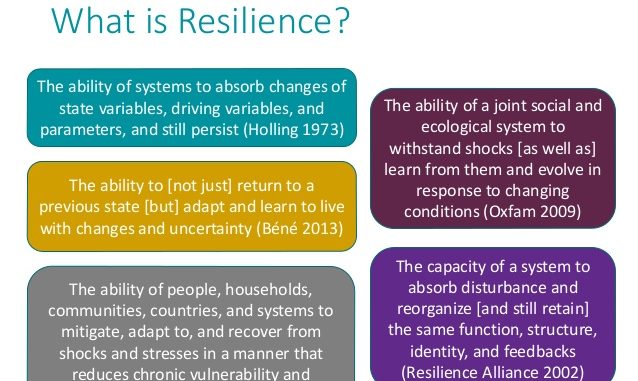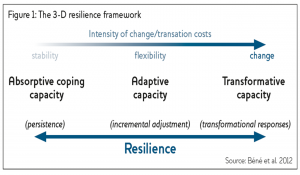
Table of Contents
What is Shock/Shocks?
- In general, shock is a sudden upsetting or surprising event or experience.
- Shock refers to high impact events, usually sudden onset that are time-bound and usually of a limited duration.
- Shock is a rapid onset, high impact disturbance to a system (e.g., ecological, economic or social).
- Shocks are sudden events that impact on the vulnerability of a system and its components
- According to Sinha and Lipton (1991), the term ‘shock ‘has a specific connotation that consists of:
- Unexpectedness i.e. the risky damaging fluctuation already happened in spite of having low probability.
- Size
- High damage due to concentration on persons with high vulnerability and low resilience
- Exogenousness in the source
- Physical or psychological strain to one or more individuals due to the stress and resilience.
What are Stresses?
- Stresses are slow onset events, changes and longer-term dynamics that are often not clearly time-bound, but do have an end (i.e., it is not an endemic issue).
- Stresses are lengthier disruptions that can be high impact, but generally occur over a longer period.
- Stresses are long term trend that decreases the potentiality and increases the vulnerability.
- Stresses are slower onset or prolonged disturbance that shifts systems and introduces unpredictability.
Common Types of Shocks and Stresses:
| Geophysical/ Meteorological | Human-Induced |
| · Typhoons/hurricanes/cyclones
· Tornadoes · Severe thunderstorms · Flooding · Earthquakes · Tsunamis · Landslides · Volcanoes · Heat/cold waves · Drought · Wildfires (naturally occurring) · Climate variability · Land degradation |
· Terrorism
· Conflict · Gender-based violence · Coups · Crime/ violence · Fire · Social exclusion/ discrimination · Market failures · Population pressure · Extreme poverty · Irregular migration · Land/soil degradation |
| Biological | Technological |
| · HIV/AIDS
· Vector borne diseases (dengue, influenza, malaria, etc.) · Hepatitis · Cholera · Avian Influenza · Ebola · SARS |
· Toxic spills
· Dam failure · Nuclear disaster · Grid failure |
What is Risk (particularly terms of climate change)?
- In general, the risk is a condition relating to exposure to danger.
- Risk is an insight into highly unpredicted events that cause wellbeing fatalities.
- Risk are prospects of a shock.
- Climate risk means the possibility of threat due to the undesirable change in climate that might be life threatening to humans, animals, and natural environment.
- The World Economic Forum has ranked climate-related risks – including extreme weather events, water scarcity and the failure to adapt and mitigate climate change.
What is Resilience?
- Resilience is the ability to cope with adverse shocks and stresses, and to adapt and learn to live with changes and uncertainty.
- Resilience is the ‘ability to resist, recover from, or adapt to the effects of a shocks or a change.
- Resilience is “the ability of people, households, communities, countries, and systems to mitigate, adapt to, and recover from shocks and stresses in a manner that reduces chronic vulnerability and facilitates inclusive growth.” (USAID, 2012)
- Resilience is the capacity of communities in complex socio-ecological systems to learn, cope, adapt, and transform in the face of shocks and stresses.
- In general, resilience is the ability to recover rapidly from difficulties; toughness.
- Resilience is not only about bouncing back but it also refers to integrating adaptation and transformation while undergoing change.

Dimensions of Resilience:
There are three dimensions of resilience, also known as 3-D resilience framework:
- Absorptive coping capacity
- Adaptive capacity
- Transformative capacity

Four components of resilience:
- People
- Shocks/stresses
- Systems
- Capacities
What is Disaster Resilience?
‘Disaster Resilience is the ability of countries, communities and households to manage change, by maintaining or transforming living standards in the face of shocks or stresses – such as earthquakes, drought or violent conflict – without compromising their long-term prospects’ (DFID, 2011).
Resilience-in terms of climate change:
- Resilience means the cope-up ability of biological organisms or human and non-human systems to endure and react to changes in the earth’s climate.
- A way to bridge the conceptual divide between mitigation approaches to climate change on the one hand and adaptation approaches on the other.
- The formal, Intergovernmental Panel on Climate Change (IPCC) definition of resilience is the “capacity of social, economic, and environmental systems to cope with a hazardous event or trend or disturbance, responding or reorganizing in ways that maintain their essential function, identity, and structure, while also maintaining the capacity for adaptation, learning, and transformation.
Preventive Measures for Shocks and Stresses:
- Increasing resilience to shocks and stresses.
- Improving preparedness in the face of shocks and stresses:
- Reinforce capacities on preparedness
- Establish multi-sectoral analysis
- Enhance institutions and community’s preparedness
- Strengthen uncertainty, surveillance and early warning system:
- Link early warning information with internal preparedness and emergency response planning
- Support surveillance and early warning systems
- Increase skills of communities to better manage uncertainty and change
- Converse skills and knowledge into learning, experimentation, and intervention
- Manage risks and enhance community resilience:
- Set up multi-sectorial programming
- Ensure hazard-proofed livelihoods and infrastructure (e.g. use of resistant seeds, or bank rice).
- Promote a healthy environment
- Take account good practices and learning process
- Adequate financial protection mechanisms following disasters, impacts on health and wellbeing can lead to potentially impoverishing health expenditures in the short and long run.
- Support universal health coverage because:
- UHC aims to ensure that everyone has access to quality healthcare without enduring financial hardship.
- Progress towards UHC creates a ‘no regret’ dividend whereby healthier populations with improved quality of life are also more resilient to the emergence and impacts of disasters and emergencies.
- Improve prevention and response capacities to mitigate outbreaks of disease which can lead to, or be caused by, disasters.
- Developing adaptive mechanisms, as they are key to ensure that funding streams can address the impacts of shocks and stresses.
- Delivery of services during the times of shock and stress and even before and after they rise.
References and For More Information:
http://hdr.undp.org/en/content/climate-shocks-and-their-impact-assets
https://www.who.int/phe/climate/conference_briefing_1_healthresilience_27aug.pdf
http://www.fao.org/3/i3084e/i3084e03.pdf
https://www.acciona.com/climate-change/
https://impakter.com/what-is-climate-resilience/
https://www.odi.org/sites/odi.org.uk/files/resource-documents/11931.pdf